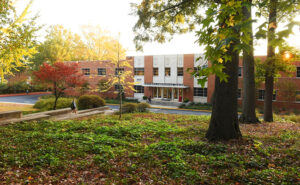 The University of Georgia’s College of Engineering will reorganize its administrative structure under a plan approved Nov. 16 by the University Council. The move is designed to streamline operations in the college, which has seen its enrollment quintuple in five years, while advancing the college’s interdisciplinary teaching, research and service.
The University of Georgia’s College of Engineering will reorganize its administrative structure under a plan approved Nov. 16 by the University Council. The move is designed to streamline operations in the college, which has seen its enrollment quintuple in five years, while advancing the college’s interdisciplinary teaching, research and service.
The College of Engineering will divide into three academic units at the beginning of the spring 2017 semester: The School of Electrical and Computer Engineering; the School of Chemical, Materials and Biomedical Engineering; and the School of Environmental, Civil, Agricultural and Mechanical Engineering.
“Our rapid growth demands that the college evolve to ensure the integrity of our academic programs and the efficiency of our administration,” said Donald J. Leo, the college’s dean. “But we need to evolve in a way that preserves and enhances the interdisciplinary and collaborative spirit of our teaching and research.”
In fall 2011 (the year before UGA established the College of Engineering) enrollment in engineering programs totaled about 400 students. Enrollment reached nearly 2,000 students this fall. The engineering college has added more than 20 faculty members in the past three years, nearly a third of its total faculty.
The new schools within the College of Engineering will be led by a chair who reports directly to the dean. The inaugural chairs have been selected by faculty members and will serve while the college conducts a search for candidates to fill the positions long term. The inaugural chairs are Takoi Hamrita (School of Electrical and Computer Engineering), Ramaraja Ramasamy (School of Chemical, Materials and Biomedical Engineering) and Sidney Thompson (School of Environmental, Civil, Agricultural and Mechanical Engineering).
The college’s faculty self-selected the schools they will affiliate with, based on their teaching and research interests. Currently, all faculty members report directly to the dean’s office.
Under the change, the School of Electrical and Computer Engineering will administer undergraduate degrees in electrical engineering and computer systems engineering.
The School of Chemical, Materials and Biomedical Engineering will be responsible for undergraduate and master’s degrees in biological engineering and biochemical engineering.
Undergraduate degrees in environmental, civil, agricultural and mechanical engineering as well as master’s degrees in agricultural engineering and environmental engineering will be administered by the School of Environmental, Civil, Agricultural and Mechanical Engineering.
The master’s in engineering degree and doctoral programs in agricultural engineering, biological engineering and engineering will be administered collectively across all three schools.
One of the primary goals of the college’s reorganization plan is to enhance the student experience, according to Leo. The new administrative structure is designed to provide a more efficient advising process and to create smoother procedures for transfer students. In addition, the implementation of a new high-demand major process in the college will be led by faculty in the three schools.
The college also believes the changes will help improve the national and international stature of its programs by creating an identity that promotes interdisciplinary, collaborative research and education that crosses traditional engineering disciplines.
“I’m pleased that the University Council has approved our proposal and I’m excited about the opportunity to bring a new focus to our college’s innovative and interdisciplinary academic programs, research and service,” Leo said.


